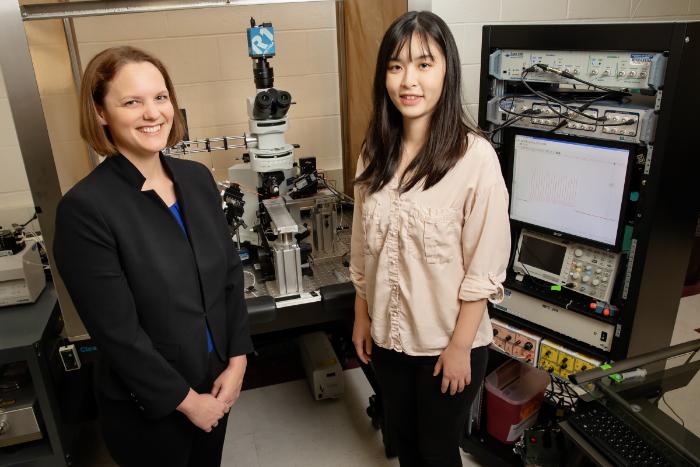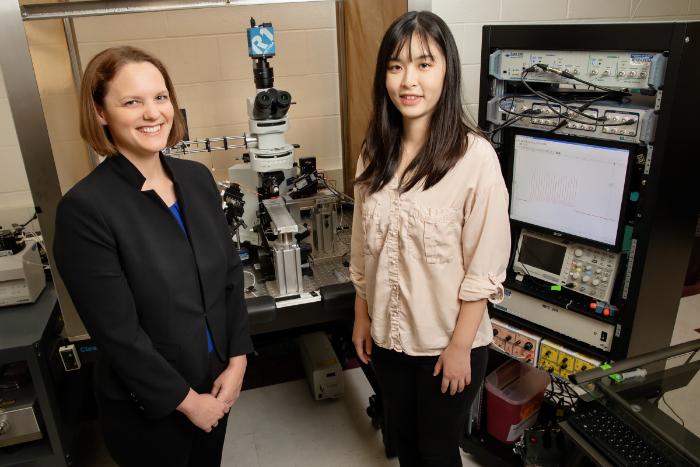
Credit: Photo by L. Brian Stauffer
CHAMPAIGN, Ill. — Mice with epilepsy have altered patterns of neuron activity in the portion of the brain that controls the reproductive endocrine system, University of Illinois researchers report in a new study. Furthermore, the differences in neuron activity in female mice fluctuate across the reproductive cycle, the team found.
The study, which tracked hormone levels and activity in specific neurons that trigger the release of reproductive hormones in mice with epilepsy, demonstrates that the effects of epilepsy on other areas of the brain may not be as static as researchers have thought, said study leader Catherine Christian, a professor of molecular and integrative physiology at Illinois. The study was published in the journal eNeuro. Jiang Li, a graduate student at the U. of I., was the lead author of the study.
People with temporal lobe epilepsy – the most common type affecting adults – also have high rates of problems with their reproductive endocrine systems, though the connection is poorly understood.
"Endocrine disruptions are a prominent comorbidity with epilepsy, yet there haven't been good basic research studies done to start to tease apart what's happening in the brain to drive this connection," Christian said. "If we can identify the neural mechanisms that are happening in the brain to link epilepsy and reproductive endocrine disruptions, can that give us a new target and, perhaps, a chance of better treating the epilepsy as well?"
Christian's research group studied a mouse model of epilepsy commonly used in research. Though not a perfect analog of human epilepsy, it has many similarities, including spontaneous, localized seizures and – as Christian's group demonstrated in another recent study – a high probability of endocrine disruption.
"The advantage of working in a mouse model is that we can directly record from specific neurons and look at the changes in their activity, comparing epileptic mice with those that don't have epilepsy," Christian said. The researchers also compared males with females, as well as comparing female mice with epilepsy that developed estrous cycle disruptions with those that maintained normal cycles – groups never before compared in a study of epilepsy, Christian said. The mouse estrous cycle is similar to the human menstrual cycle, although only a few days in length.
The researchers tracked hormones in the animals' blood and saw that while testosterone levels remained unaltered in male mice, female mice with epilepsy showed significant changes in levels of the hormones estradiol and progesterone.
Then the researchers studied the firing activity of the specific neurons in the brain that trigger the body to release reproductive hormones. Across the board, neurons from mice with epilepsy were more excitable, meaning more likely to fire in response to incoming signals. However, neuron firing activity varied among the groups. Of the epileptic mice, males and females without endocrine disruptions showed small changes in firing activity compared with the control group. However, female epileptic mice with endocrine disruptions had dramatic shifts in firing activity that fluctuated across the cycle.
In female control mice, the hormone-signaling neurons had high rates of firing during one stage of the estrous cycle and lower rates of firing during another stage. However, in female mice with epilepsy and endocrine disruptions, the opposite pattern emerged.
"There are many fluctuations and dynamic changes going on during the female cycle, and signals in the mice with epilepsy are going in the wrong direction at the wrong time," Christian said. "We usually think of neurological changes correlated with epilepsy going in one direction – too much or too little – at a static rate, and tailor treatments to correct that. But here, we show that one neuron population has big fluctuations in activity. At one stage of the cycle, they're showing higher rates than what would be expected, but at another point in the cycle their activity is strongly suppressed."
Next, the researchers plan to investigate activity both downstream from the neurons – the pituitary gland and reproductive organs – and upstream, attempting to trace the cause of the changes in neuron firing back to seizure activity.
"Investigating changes in neural activity and understanding that it may not be static or always in one direction is very important, not only for understanding basic research findings in animals but for developing new therapies as well," Christian said. "This study shows that the effects of epilepsy on the neural control of reproduction is not a one-size-fits-all thing. Having a picture of the overall endocrine status could be very important in understanding why a certain treatment isn't effective. For women with epilepsy, we probably need to be more sensitive to timing treatments to certain phases of the menstrual cycle."
###
The National Institutes of Health and the Beckman Institute for Advanced Science and Technology, which Christian is affiliated with, supported this work.
Editor's notes: To reach Catherine Christian, call (217) 244-8230; email: [email protected].
The paper "Dynamic and sex-specific changes in gonadotropin-releasing hormone neuron activity and excitability in a mouse model of temporal lobe epilepsy" is available online.
DOI: 10.1523/ENEURO.0273-18.2018
Media Contact
Liz Ahlberg Touchstone
[email protected]
217-244-1073
@NewsAtIllinois
http://www.illinois.edu
Original Source
https://news.illinois.edu/view/6367/704835 http://dx.doi.org/10.1523/ENEURO.0273-18.2018





